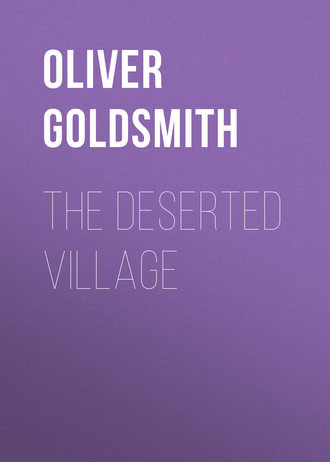полная версия

Оливер Голдсмит
The Deserted Village
Swells at my breast, and turns the past to pain.
In all my wanderings round this world of care,
In all my griefs – and God has given my share —
To husband out life's taper at the close,
And keep the flame from wasting by repose:
I still had hopes, my latest hours to crown, Amidst these humble bowers to lay me down;
I still had hopes, for pride attends us still,
Amidst the swains to show my book-learn'd skill,
Around my fire an evening group to draw,
And tell of all I felt, and all I saw;
And, as a hare, whom hounds and horns pursue,
Pants to the place from whence at first he flew,
I still had hopes, my long vexations past,
Here to return – and die at home at last.
O blest retirement, friend to life's decline,
Retreats from care, that never must be mine:
How blest is he who crowns, in shades like these,
A youth of labour with an age of ease;
Who quits a world where strong temptations try,
And since 'tis hard to combat, learns to fly!
For him no wretches, born to work and weep,
Explore the mine, or tempt the dangerous deep;
No surly porter stands, in guilty state,
To spurn imploring famine from the gate —
But on he moves to meet his latter end,
Angels around befriending virtue's friend;
Sinks to the grave with unperceived decay,
While resignation gently slopes the way;
And, all his prospects brightening to the last,
His heaven commences ere the world be past.
Sweet was the sound, when oft, at evening's close,
Up yonder hill the village murmur rose:
There, as I pass'd with careless steps and slow,
The mingling notes came soften'd from below;
The swain responsive as the milk-maid sung,
The sober herd that low'd to meet their young;
The noisy geese that gabbled o'er the pool,
The playful children just let loose from school;
The watch-dog's voice that bay'd the whispering wind,
And the loud laugh that spoke the vacant mind;
These all in sweet confusion sought the shade,
And fill'd each pause the nightingale had made.
But now the sounds of population fail:
No cheerful murmurs fluctuate in the gale,
No busy steps the grass-grown footway tread,
But all the bloomy flush of life is fled;
All but yon widow'd solitary thing,
That feebly bends beside the plashy spring:
She, wretched matron, forced in age, for bread,
To strip the brook with mantling cresses spread
To pick her wintry faggot from the thorn,
To seek her nightly shed and weep till morn;
She only left of all the harmless train,
The sad historian of the pensive plain.
Near yonder copse, where once the garden smiled,
And still where many a garden flower grows wild,
There, where a few torn shrubs the place disclose,
The village preacher's modest mansion rose.
A man he was to all the country dear,
And passing rich with forty pounds a year;
Remote from towns he ran his godly race,
Nor e'er had changed, nor wish'd to change his place
Unskilful he to fawn, or seek for power,
By doctrines fashion'd to the varying hour;
Far other aims his heart had learn'd to prize,
More bent to raise the wretched than to rise.
His house was known to all the vagrant train;
He chid their wanderings, but relieved their pain:
The long remember'd beggar was his guest,
Whose beard descending swept his aged breast;
The ruin'd spendthrift, now no longer proud,
Claim'd kindred there, and had his claims allow'd;
The broken soldier, kindly bade to stay,
Sate by his fire, and talk'd the night away;
Wept o'er his wounds, or, tales of sorrow done,
Shoulder'd his crutch, and show'd how fields were won.
Pleased with his guests, the good man learn'd to glow,
And quite forgot their vices in their woe;
Careless their merits or their faults to scan,
His pity gave ere charity began.
Thus to relieve the wretched was his pride,


